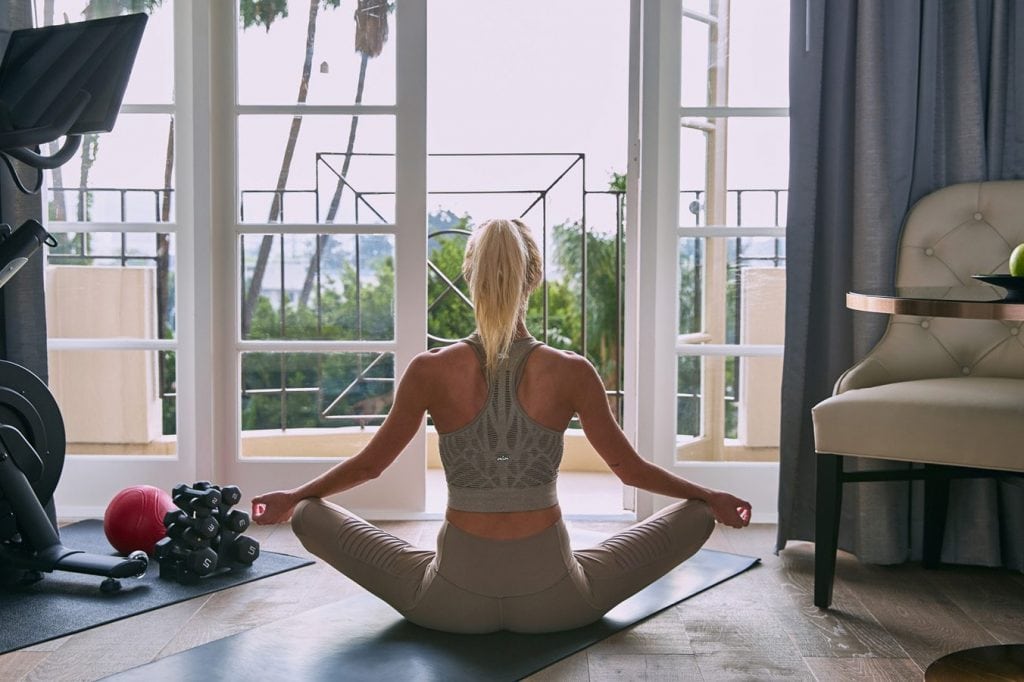Hotels Use Technology and Design to Evolve the Healthy Room

Skift Take
Can a hotel room make you healthier? The jury is still out, but judging from some recent experiments, there may be more than a nugget of truth to the idea.
Delos, which pioneered the term “wellness real estate”, introduced the concept of an uber-healthy hotel room at the MGM Grand in Las Vegas, Nevada back in 2012. It is now bringing its Wellness Rooms to the Four Seasons Los Angeles at Beverly Hills. At the same time, Swissôtel is expanding its own version of a healthy room.
In all cases, the idea is to incorporate health-boosting technologies and ambient design elements to improve wellness. We are talking about things like special lighting to counter jet lag, aromatherapy, dawn simulator alarm clocks, special air purification systems and wisdom from Deepak Chopra. Okay, only Delos has Chopra on board. His knowledge, along with that of the Cleveland Clinic, has been incorporated into the programs offered at MGM and Four Seasons.
The Four Seasons Hotel Los Angeles at Beverly Hills launched its partnership with Delos at the end of November 2017. Located on the hotel's spa level, five wellness-themed guest rooms and two suites combine the latest technology from Delos, along with a stylish room aesthetic and the eco-chic features you would expect in L.A.
According to Michael Newcombe, general manager and chair of the company’s Global Spa and Wellness Task Force, the concept has potential to become ubiquitous. Having a "room product dedicated to supporting a wellness-based lifestyle while on the road... is a choice that hoteliers will have to get used to." The concept will be tested through July 1, 2018, at which time guest feedback will be assessed. If guests give the thumbs up, the plan is to add more such rooms at the Beverly Hills property and beyond.
Meanwhile, in Switzerland, a new wellness room concept is taking shape at Swissôtel. The Swissôtel Zurich is still tinkering with its Vitality Suite, which it introduced at the end of 2016. It's an evolution of the company’s ongoing Vitality program aimed at “inspiring travelers to maintain an active and energized body and mind while on the road.” Until last year, that program had been focused on food and fitness offerings. But according to Lilian Roten, vice president of brand management for Swissôtel and Pullman, “We realized that we had to bring this vitality focus into the guestroom... to package it up and build a room that would be the embodiment of vitality.”
And so, in Zurich, Swissôtel has reconfigured one of its conventional suites into a hardcore wellness sanctuary. Design elements include hardwood floors, soft color palettes, ergonomically-functional furniture, black-out blinds and bathrooms with spa features like aromatherapy and chromatherapy tubs.
There’s also a great deal of attention paid to allowing guests to personalize their experience. For example, company literature says, “In a first for the hotel industry, circadian light is accommodated on demand. Circadian light features allow light color to change, influencing the secretion of melatonin in the brain, helping travelers overcome jet-lag or lack of sunlight,” along with enhancing the quality of sleep.
Meantime, the built-in Wellbeing Wall offers guests a variety of training options, as it contains dumbbells, horizontal bars and cable-pull systems. A multilingual cyber-trainer via a touch-screen monitor displays exercises geared towards strengthening, stretching, meditation and breathing.
There are plans to develop Vitality Rooms in North America and Asia. The Swissôtel Chicago is slated to be the first hotel outside of Switzerland to introduce the concept, most likely next year. In Asia, the company’s Singapore property will be the first to get an update.
"What we are looking into is evaluating what regional adaptations would be necessary to make rooms relevant for various markets," said Roten.
At the same time, she notes, certain features will always be mandatory. Among them are floors uncovered by carpet; work areas with adjustable desks with options for standing or sitting; bathroom spa experiences; and a Wellbeing Wall. Inclusion of an air purification system will only be required in cities with air quality indexes above 50 (that’s you, Beijing).
While the Vitality Room per se will be exclusive to Swissotel, Roten says that other AccorHotels brands are likely to incorporate aspects of the concept over time.
Meantime, back in the United States, Delos Stay Well rooms have been introduced to half a dozen Marriott properties on the East Coast during the past year. Should Marriott and AccorHotels fully buy in, healthy rooms may prove to have legs beyond luxury brands.
Skift Hospitality Editor Deanna Ting contributed to this report.




